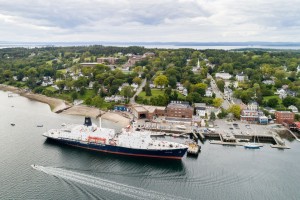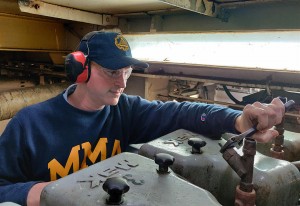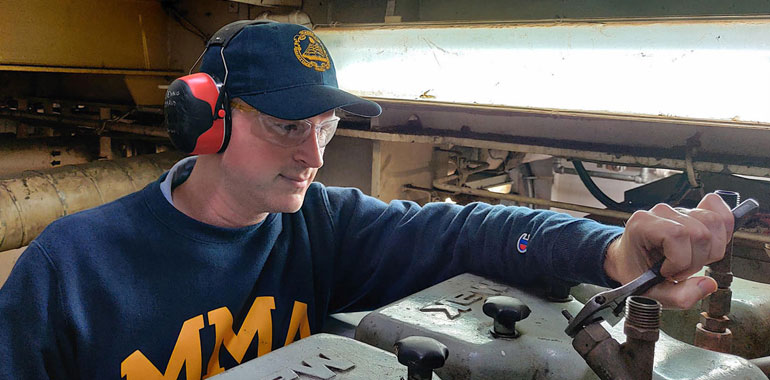
For Maine Maritime Academy engineering senior Edward Dennis, a pandemic-necessitated “sail” while docked wound up being more worthwhile than normal at-sea training.
“There are fewer of us on board, so we’re getting a lot of one-on-one time,” said Dennis, who trained dockside for a month over the summer aboard the academy’s State of Maine. “We’re really getting more hands-on training this way.”
Maritime schools scrambled to find ways amid the pandemic to ensure their seniors could finish degree requirements, sit for U.S. Coast Guard exams to get licensing credentials, accept jobs and move forward.
Maine Maritime opted for a fast sail (holding fast) to safely achieve those goals, said Mark Cote, interim provost and professor of engineering. This meant ensuring that everyone on board State of Maine was coronavirus-free, and that wasn’t a simple proposition.

It was made easier via a high school friend of Maine Maritime President William Brennan. The friend, who works for Puritan Medical Products, connected Brennan to a higher-up at The Jackson Laboratory, who then arranged for COVID-19 testing with 24-hour results. Efficient double testing was thus possible, and students strictly quarantined between results at academy dorms. Food was delivered, and cadets could only leave their rooms for limited, socially distanced outdoor exercise.
Cote expressed appreciation to Puritan, Jackson Lab and the Coast Guard, which allowed shorter-duration dockside training in lieu of sea time. Normally, final at-sea training would take place over 74 days in May, June and part of July. This time, once all 60 people going aboard were cleared medically — 33 students, faculty, staff and crewmembers — training began July 8 in Castine. Noise complaints led to moving the ship to dock space in nearby Searsport, and work wound down Aug. 4.
“The quarantining wasn’t easy or something that will be treasured as a memory,” Cote said. “But all the students were pretty motivated.”
Before this plan was hatched, Dennis was among many seniors at the nation’s maritime schools anxiously wondering if they’d have to indefinitely postpone at-sea work. The husband and father of two said he’s grateful that was avoided, and that nothing substantial was sacrificed by training dockside.
“It does feel like we’re on a cruise, except for not going to ports and being confined to the ship. We’re still doing the same training exercises,” Dennis said while on board. Students worked on all ship systems; the only real difference was not having the main engine up and running all the time.
Cote said knowing that seniors had experienced at-sea training previously helped make this “an acceptable accommodation for dealing with the pandemic.”
Texas A&M Maritime Academy also offered abbreviated training this year but did sail. Cadets stayed close to home in the Gulf of Mexico, however, instead of heading to Norway, Poland, Iceland, New York and Massachusetts aboard Massachusetts Maritime Academy’s loaner T/S Kennedy.
“For the first time ever, our tiny ship was to our benefit,” said Rebecca Watts, the school’s director of marketing and communications, explaining that the vessel’s 75-person capacity limited the number (a total of 62 aboard) needing to quarantine from June 19 to July 3 on the Galveston campus.
All participants were tested five days into the quarantine that preceded the cruise, and then 10 days into it.
“I’m grateful that we were able to push forward,” Watts said. “It took a lot of heavy lifting, but we were really eager to make sure students weren’t delayed. The Coast Guard allowed us to have a testing facility on campus so that we could get out the door.”
Watts said training under some duress created extra-valuable job candidates. “We think this experience has made them more attractive for jobs in industry,” she said.
California State University Maritime Academy hired a COVID-19 testing company with quick turnaround times to set up on campus, said Donald Maier, dean of the School of Maritime Transportation, Logistics and Management. This allowed 275 freshmen and sophomores to come back to finish spring-semester studies during the summer and, in another stage, 75 seniors finished coursework on campus. Then 23 took part in dockside training to fulfill at-sea requirements. Anyone on campus had to quarantine until getting their test results and could be tested again.
Maier said many students had jobs lined up but couldn’t start without a license, so he wrote to many employers asking them to extend their offers.
Having completed its training cruise through the Caribbean before COVID shut down everything, Mass Maritime was the envy of all. Having its sea term traditionally run January to March worked out “super beneficially this year,” said Brigid Pavilonis, provost and vice president of academic affairs, noting that seniors returned a bit early on Feb. 22.

